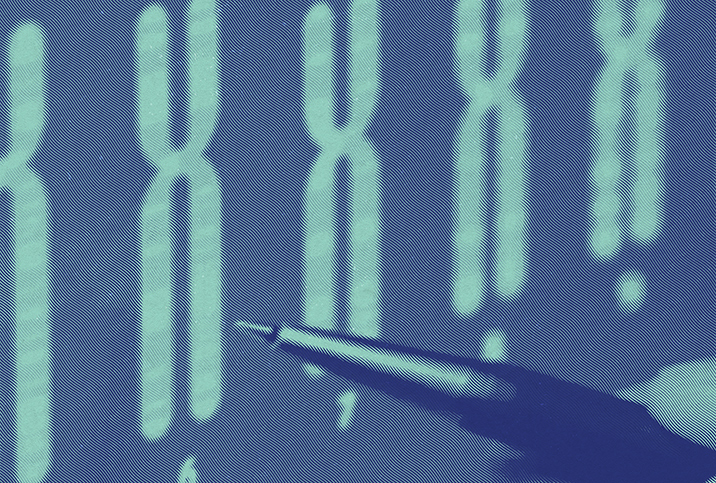What Can Artificial Intelligence Do for Your Pregnancy?

Artificial intelligence (AI) is transforming the world. Medicine is one field where AI could help healthcare professionals and their patients, especially relating to preconception, fertility and pregnancy.
For OB-GYNs and fertility specialists, AI may have a considerable reach, contributing to healthier pregnancies, better outcomes and safer deliveries.
What could AI do for someone who wants to conceive?
AI, preconception and fertility
"AI is already well-involved in several human reproduction areas, especially for ART [assisted reproductive technology] procedures," said Dominic Gabriel Iliescu, M.D., Ph.D., chief obstetrics physician at the University of Medicine and Pharmacy in Craiova, Romania. "AI can help to identify viable and healthy embryos."
A 2022 study published in Current Opinion in Obstetrics and Gynecology stated: "Artificial Intelligence has been used to select the embryos with high implantation potential, proper ploidy status, to predict later embryo development, and to increase pregnancy and live birth rates."
AI could be used in various ways in fertility treatment, according to Eduardo Hariton, M.D., M.B.A., an OB-GYN and reproductive endocrinology and infertility specialist at the Reproductive Science Center of the San Francisco Bay Area.
The use of AI could include:
- Predictive modeling. AI can be used to analyze patient data and predict the likelihood of success for different fertility treatments.
- Image analysis. AI could help identify the best embryos for implantation, following an analysis of embryo images, such as those taken during in vitro fertilization (IVF).
- Personalized treatment plans. AI could use individual characteristics and medical history to craft custom treatment plans.
- Monitoring and tracking. AI can be used to monitor and track the progress of fertility treatments.
- Automation. AI could improve efficiency by automating certain tasks, such as scheduling appointments or ordering tests.
- Clinical research. AI can be used to analyze large amounts of data from clinical studies to identify patterns and insights that could help improve fertility treatments.
"All of these applications are in their infancy, and while there are many groups working on these, none of them are standard of care yet. That said, I am confident that AI will play an integral role in the future of fertility care," Hariton said.
Pregnancy journey with artificial intelligence
"In spite of the progress in prenatal medicine diagnosis, still, a large amount of the major malformations remain undetected, and the standard care in estimating the birth outcome relies on clinical 'blind' labor monitoring," Iliescu said.
Published literature regarding AI use suggests significant improvement in these areas.
Iliescu and co-author Smaranda Belciug explored fetal well-being tracking during all trimesters through artificial intelligence in their 2022 book, "Pregnancy With Artificial Intelligence: A 9.5 Months Journey From Preconception to Birth."
They illustrated how AI data could help healthcare providers in a variety of situations, such as looking for signs of congenital disease and determining the risk of preterm delivery.
"AI can be used to analyze patient data and predict the likelihood of complications during pregnancy, such as preterm labor or gestational diabetes," Hariton said, adding that with image analysis, AI could help analyze ultrasound images to detect potential problems.
Similarly, artificial intelligence can provide early alerts to healthcare providers if any concerning signs are detected during monitoring. Additionally, it can create personalized treatment plans, automate tasks such as scheduling appointments and help with electronic health records management, which can flag potential problems and critical information, Hariton said.
Could AI minimize labor and delivery risks?
Tracking pregnancies with artificial intelligence can help achieve better outcomes, predict risks and avoid complications during labor, suggested a 2022 Mayo Clinic study.
"Once validated with further research, we believe the algorithm will work in real time, meaning every input of new data during an expectant woman's labor automatically recalculate the risk of adverse outcome," said Abimbola Famuyide, M.B.B.S., an OB-GYN at Mayo Clinic in Rochester, Minnesota, and the senior author of the study.
These models promote individualized decisions, using baseline and labor characteristics of each patient, said the researchers, who analyzed 66,586 deliveries (from admission and during labor) from the database of the National Institute of Child Health and Human Development.
The authors noted that not only could machine learning reduce adverse outcomes, but it could also help reduce costs related to maternal morbidity, which cost the United States $32.3 billion in 2019, according to a report from Mathematica and the Commonwealth Fund.
Challenges and benefits of using AI in healthcare
Artificial intelligence will not replace medical professionals. However, doctors could potentially benefit in terms of improved outcomes, reduced workloads and reduced healthcare costs, suggested a 2020 study published in Cureus Journal of Medical Science.
There are challenges that are inherent to all new techniques proposed for general practice, Iliescu said. He added that implementing new approaches requires a large amount of data demonstrating the efficacy of the proposed new techniques. It can also be difficult for physicians to accept major changes in their general practice.
"AI will overcome these issues if a significant amount of literature will provide the necessary data on the superiority of the respective techniques." Iliescu said.
But for the new techniques to work, of course, they must be implemented with extensive training of healthcare providers and investments in appropriate equipment and software, Iliescu added.
"AI has the potential to help the prenatal investigations in various directions. From getting pregnant to birth and postnatal depression, the advantages of using AI as an adjunct to medical protocols have been highlighted in numerous researches," Iliescu said.
The bottom line
Artificial intelligence has made the leap into treating prostate cancer and detecting breast cancer. Who knows what will happen next? While it could take time for other healthcare professionals to jump on board and for the technology to be ready, the potential cost savings, improved patient care and unique perspective may be worth the wait—and the learning curve.
Don’t have a doctor? Giddy Telehealth provides a one-stop destination for finding and scheduling a healthcare professional in a slew of specialties. Many offer same-day appointments and video consultations.
















